
Headmaster's Reflections
Headmaster
Dr Alec O'Connell

Headmaster
Dr Alec O'Connell
Welcome back from the long weekend, a weekend that we colloquially refer to as ‘the boarders’ long weekend’. From a personal observation it appeared that a lot of people took advantage of the border restrictions being relaxed and headed in all directions for a change of scenery.
In so many ways it was very encouraging to see families returning to their normal activities. However, it is still important that we continue to exercise caution in our interactions with each other, remembering to respect social distancing, maintain basic hand hygiene, and, for those who support the concept, sign up to the COVID-19 app. While in WA we appear to be in a very favourable position regarding the level of infections and cases of COVID-19, that interstate schools are still having to isolate students is a salient reminder that we must continue to be vigilant and community minded.
The most exciting development this week is that the majority of our boarding community should be back on site with the formal return of Year 7 and 8 to their boarding house. Their return was deferred until after the break to allow us to complete some minor works geared at improving the safety for students and staff in the Year 7/8 boarding house. I look forward to seeing all of our boarders around the College over the coming week.
With the State Government’s recent announcement that WA would commence Phase 3 of the COVID-19 Road Map to Recovery on 6 June, the PSA committee is able to confirm the staged commencement of the PSA Winter Sport for 2020.
While maintaining the health and safety of our community, the return of sport will be staged with Senior Badminton and Cross-Country competitions commencing on Saturday 6 June. However, this weekend is the bye weekend for Scotch so we will not be competing against other schools in these two sports. Parents will receive instructions from the Director of Sport Mr Richard Foster about our internal sport commitments and training sessions for this week. This will include all sports and codes.
Sport will recommence for all JPSSA students on Thursday 11 June followed by PSA competitions for Year 7–9 students, across all codes, on Friday 12 June.
Full Senior fixtures will look to commence on Saturday 13 June. This will be sport specific and subject to approval and / or endorsement from respective Sport Management groups at each school following consultation meetings over the next few days. We will confirm the senior fixtures later this week.
The PSA committee, comprised of the seven Headmasters and Principals, acknowledge all school communities for their support and understanding throughout the process.
The May edition of Clan is known for including an insert for the College’s Annual Appeal. When the 2020 copy comes out shortly, regular readers will notice the appeal is not included this year. For obvious reasons, 2020 is a very unusual year and we acknowledge the financial challenges many families are facing.
Having said this, in advance of the distribution of the May Clan, we have had a number of enquiries about giving financial support to the College. In 2020 we established a new Office of Advancement and Philanthropy, headed up by Director Kate Quinn. If you wish to give to any appeal or fund, in the first instance, please contact Mel Colling, Executive Assistant on +61 8 9383 6987 or mel.colling@scotch.wa.edu.au.
Your ongoing support is crucial to our College.
Throughout the last couple of months, the driving priority for our Council and the College has been to support our students and their families to work through a time of uncertainty and challenge. While things are on the up, I would like to remind all families that should you need assistance or wish to discuss any matter of which we can be of assistance, please do not hesitate to contact my office. This includes our OSC community as well. All conversations are treated with the highest level of confidentiality.
While it is great to see that things are improving, there is no doubt that challenging times remain ahead for many in our community. We do not want any student to have to leave because of recent times and supporting families will continue to be our priority. We are here to help and support you. That is the role of a strong and united community such as Scotch.
Have a great fortnight,
Dr Alec J O’Connell
Headmaster
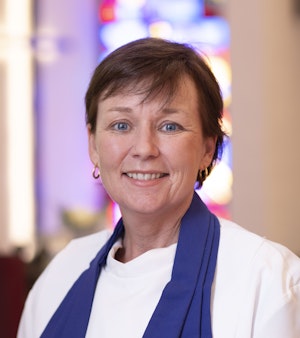
Revd Justine Wall
Chaplain
For most people, our identity is fluid in our teenage years. It is unsettled, changeable and erratic. Some young people worry about who they are becoming. You might feel like you're one type of person today and a completely different person tomorrow. That's okay. Your identity is still taking shape and it will be for some years to come.
There are two important questions I think we should ask ourselves when we are reflecting on who we really are. The first is, am I being true to myself? Is the image I'm projecting and the identity I'm claiming for myself consistent with my own values? The second question is, does it really matter what other people think of me? Sometimes it's hard to be yourself in the face of peer pressure and public expectations. However, it's even harder to live a lie and wear a mask all your life.
It takes courage to be yourself and to define your own identity. You should always respect someone who shows that strength of character. People like Mohammed Ali, the world heavyweight boxer, who changed his name from Cassius Clay, which he regarded as a slave name, to a Muslim name, which reflected his faith in Islam. Another person who has the mettle to be herself is Catherine McGregor AM, a former Army officer, transgender activist, and sports commentator. It can't have been easy for Catherine or Mohammed, but they were faithful their true identity .
It says in the Bible, that God knows everything about each one of us. So always remember, God knows who you really are and loves you.
For you created my inmost being;
you knit me together in my mother's womb.
I praise you because I am fearfully and wonderfully made;
your works are wonderful,
I know that full well.
Psalm 139
God Bless

Mrs Cara Fugill
Director of Teaching and Learning
Many Year 12 boys this week will be letting out a sigh of relief, as unconditional offers from the University of Western Australia (UWA) arrive in the mail for 2021.
Six weeks ago, UWA announced they were inviting students to apply for 2021 admission direct to their university using Year 11 grades and course scores. The rationale behind this move was to decrease the uncertainty for Year 12 students who were facing the prospect of online learning for extended periods of time as COVID-19 began to impact Western Australia.
Last year, UWA, Curtin University, Edith Cowan University and Murdoch University introduced an early offer scheme where students could apply in May and be accepted on the condition that their final marks were in line with the predicted result. Therefore, it came as quite a surprise to schools when UWA declared the offers given to students, based on Year 11 predicted ATARs or IB points were unconditional, regardless of the student's final grades, course scores, ATAR or IB points in Year 12. Considering that approximately 85% of Scotch College students qualify for university each year, with 70% earning the necessary score to enter UWA, one might question the impact this could have on the motivation of our Year 12 group when their end goal is taken away.
Although concerning for some, on the whole , Scotch College students aren't driven solely by a score. As a College we often speak about the journey, the need to develop intrinsic motivation, the reward of hard work, the skills acquired from stretching yourself and the commitment to a greater pursuit over individual success. On asking our Year 12 students "will this early offer impact your desire to work hard?", many indicated that regardless of the offer their main goal was to finish well. This was pleasing to hear since individual student performance can have a significant impact on how each subject is moderated. If students perform lower in the final examinations than expected, the school scores will be moderated down, impacting all students who take that course. Our Year 12 students understand the process of moderation and have a sense of commitment to the College and their friends so are less likely to disengage from the important learning that occurs throughout their final year and will prepare them best for university, whilst providing a strong academic and co-curricular resume that will no doubt result in scholarships.
Staff are working very hard to ensure the impact on academics caused by COVID-19 is minimised . As Year 11 and 12 reports are released, it will give us the opportunity to track and monitor the progress these students are making. At the House Head meetings students will receive important information about their predicted final result , exam performance, meeting graduation requirements and tracking information from each semester since starting Year 11 and we strongly recommend parents schedule an appointment.
Finally, like teachers, parents also have an important role to play in monitoring the academic progress of your child and any significant change that may cause you concern in relation to his study habits, performance across subjects, and wellbeing or motivation, needs to be communicated to the school so we can respond in a timely manner.

Mr James Hindle
Director of Student and Staff Wellbeing
I have written about stained glass before as a metaphor for our boys. Stained glass is really at its best when the light is shining out from within. On a dark night, there is something both mesmerising and comforting about walking past a front door that contains stained glass. Perhaps it is the ordinariness of the door during the day, combined with the transformation that takes place once the light is turned on. So it is with every individual: there are contexts and moments when you can see them come alive; when that light is turned on. Perhaps the most important tasks we have are, firstly, to ensure that the light which exists within each of our boys is kept alive and is strengthened so it can shine at the most challenging of times and, secondly, that each boy knows how to keep his light turned on when we may not be around to help him.
Of course, finding the switch – and ensuring it is on – is not always easy. Sometimes, we see some students whose light has faded somewhat. It might be because they are lacking in energy – something within is not right. At other times, it might be because the glass is dirty – and we need to ensure that the external conditions are just right for them to be able to show their true colours . For the light to shine as brightly as it should, it has to be his light, not the light we might like him to shine.
It is best to develop habits that can boost his light during times of relative quiet – particularly just after some event which has interrupted the perception of what constitutes 'normal'. After the disruption of students having to learn from home, now is a great time to reflect on how things went. I know that for some parents, it was an extremely difficult time and we thank you for your determination to make the best of trying circumstances. Your child may have found a new light: there may well be things which your son has discovered about himself which are positive and upon which he and we can build. You both may have noticed that some of the changes caused his light to dim and there may be things which he and we need to beware of for the future, should a comparable level of disruption occur.
Some of the feedback on our period of online learning discussed the importance of physical activity. Now is the perfect time to get your son into his own routine of physical activity, if he doesn't already have one. It is never too late to start, and the earlier we begin this process, the better. The sooner he can take personal responsibility for his own exercise – and find an activity which he loves to do (or is at least willing to do on a regular basis) – the better it is for him and for all of us. Even though school and community sport are beginning to start up again and these fulfill a very significant role in terms of public health and helping young people to better understand themselves and how groups work effectively, I think it is very important for an individual to have the capacity and drive to undertake their own activity. Ideally, this would be outdoors, and can be something as simple as going for a walk – with the dog and without a phone. Time spent in the natural environment is a great refresher.
Now is the perfect time to try to incorporate more good habits into our routine, and this is why I continue to emphasise the benefits of mindfulness. Our boys in Pre-Primary through to Year 3 continue to take part in yoga classes each Thursday. Relevant parents should have received information about this in last Friday's push notice. It would be great if you could speak to your son about it and get him to teach you some of the stuff they are doing. In Middle and Senior School, we are looking at scheduling mindful meditation sessions at some point in the second half of the year. We also run Brain Reset for the Year 11s and 12s after school on a Wednesday. There are also mindfulness tips in the daily notices on the homepage each Monday for boys to access.
There are also some very good apps which you and your son might like to explore. Three which come highly recommended are: Calm, Smiling Mind and Headspace. These are great for people of all ages.
I read a quote in Time magazine the other day from Milton Friedman, which he wrote in 1982: "Only a crisis – actual or perceived – produces real change. When that crisis occurs, the actions that are taken depend on the ideas that are lying around."
Friedman was of course referring to economies, but his words apply just as well to each of us. Sometimes we need to be prompted to re-examine how we approach life. If we take a few moments during the quiet times to put in place a few good ideas – or at least have these lying around – when a challenge presents itself, we are more likely to pick up on these good ideas. In doing so, we can keep the light on in those darker times.
The application date has been extended until Friday 3 July 2020 for families eligible for the Secondary Assistance Scheme (Years 7–12).
If your circumstances have changed due to COVID-19, you may be eligible to apply for assistance if you hold a current concession card.
Application forms are available from Mrs Anita Johnson in our Accounts Department via accounts@scotch.wa.edu.au.
Further information can be obtained from:
Schools Resourcing and Budgeting Directorate
Department of Education
151 Royal Street
EAST PERTH
WA 6004
Tel: 9264 4516
Email:
student.allowances@education.wa.edu.au
Normal uniform shop opening hours have resumed. As part of our COVID-19 response, we are limiting the number of people in the shop. We also prefer payments to be by credit card. The shop continues to be available online. Items can be ordered online and posted to you or collected from the uniform shop. Online payment is by credit card or PayPal.
The shop will be open on Monday 27 July (the day before Winter Term commences) from 9am–12pm and 1–4pm.
From Tuesday 28 July, normal term opening times will apply:
Tuesdays: 8am–5pm
Thursdays: 7.30–11.30am
Fridays: 7.30–11.30am

Miss Penny Hooper
Acting Head of Junior School
We have an abundance of items on the Junior School (JS) schedule this term, and whilst they are taking shape, we still need to be creative in the way we run our assemblies, our Chapel services and other events. Our focus and goals for this year are still on the forefront of our agenda as we continue to talk about upcoming changes and the need to adapt where necessary.
Class teachers have welcomed the return of their students and are extremely proud of the boys and their self-management and set-up routines for the school day. The student leadership are continuing work on their projects whilst the whole school is consolidating and operating towards the Semester 1 reports.
Mr Norman continues to work with the teachers on their planning and processes to develop tools for the classroom, as well as supporting them in their tracking and monitoring. This takes a considerable amount of time and the benefits of Mr Norman and the staff working together to assist teachers to develop and consolidate in this area are invaluable.
This goal focuses on maths and developing units of inquiry. JS staff participated in professional learning at the end of 2019, with a view to carry this over into 2020. Just prior to the move from face-to-face delivery to the SCOT programme, the subject leaders were looking at ways to assist staff and provide opportunities to share practices and ideas.
As we reached the end of one unit of inquiry, our teachers started to work on the new unit and began the provocations to generate a series of burning questions. It was wonderful to watch the work being done in the previous units and the Year 5 teachers made mention of their campaign speeches in their notices. I was present for the final touches of the Year 2 scale models that they were going to share with the Year 5 boys, and I was thoroughly impressed.
In the wellbeing arena, Mr Jon Marginis, our Wellbeing Coordinator and JS Psychologist, is working with teachers to roll out module 3 and 4 of the Protective Behaviours lessons. All students from Pre-Kindergarten to Year 5 will have sessions where Mr Marginis (or Mr Jon for the younger students) works through aspects of the protective behaviours covering who are their 'go-to-people' and how they can be assertive to refuse something they don't like.
We have also seen the return of the yoga programme this year and have been able to extend this experience to our Pre-Primary to Year 3 students this term. The sessions take place weekly or fortnightly and the students engage in a range of activities based on mindfulness and relaxation.
I look forward to observing what the remainder of the term brings and to seeing what other wonderful triumphs we can conquer.
The Very Hungry Caterpillar, written and illustrated by Eric Carle, was a wonderful source of inspiration for the Pre-Primary artists. After reading the story and many other colourful illustrated tales by Eric Carle, the boys had the opportunity to create their own collage caterpillars. Working in the lively style of Carle, they each created their own painted papers to use within their collaged artworks.
Inspired by the famous storybook, we are currently writing and creating our own charming tale entitled 'The Very Musical Monster'. Each boy added a line to the collaborative monster story. The boys will illustrate their page by the using familiar collage style of Eric Carle. The final images will be created into a storybook, one for each boy to treasure as a special memento of their Pre-Primary creative journey.
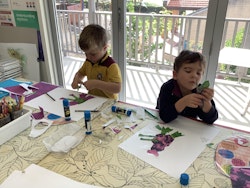
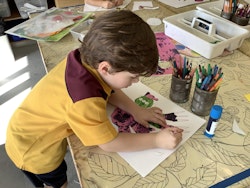
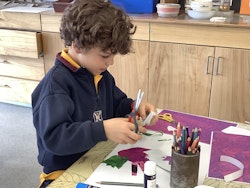
Jane Roche
Junior Art Specialist
This year the Junior School has introduced the MiniLit (Meeting Initial Needs in Literacy) programme for Year 1 and 2. It is an evidence-based, explicit and effective early literacy intervention programme for teaching reading skills.
Our trained MiniLit specialists, Mrs Michelle Scarvaci and Mrs Amanda Jenkin deliver the programme to three groups of boys in Year 1 and 2 before school four days per week. The synthetic phonic programme is highly engaging. The boys actively participate in 30-minute lessons, which involve oral sound work, written sound work, shared reading and games. The sound component involves kinaesthetic learning. The boys count sounds and track them with their hands and fingers. MiniLit consolidates basic letter/sound knowledge, decoding skills and extends word attack knowledge by teaching commonly used digraphs and longer words.
Our MiniLit specialists closely monitor and track students' progress. It is very exciting to see impressive gains. The students are becoming more and more confident in all areas of literacy: reading, writing and spelling. MiniLit is providing a solid foundation for our boys. It's setting them up for success and preparing them for future learning. Special commendations go to those Year 1 and 2 boys who commit to before-school learning.

Mrs Janet Lopez
Head of Academic Support
In 5W, we have been looking at the transdisciplinary theme of 'Sharing the Planet' with our central idea being: 'sharing resources may challenge communities to consider different perspectives'.
The final result amazed students with between 9,000 and 10,000L of water wasted a year from leaking taps.
Students have explored the United Nations Sustainable Development Goals and picked one goal that resonates with them. They have researched their goal and are in the process of finalising their report.
In Writing, we examined water wastage through dripping taps and people who leave the tap running whilst brushing their teeth. Students graphed the data and calculated how much water was wasted over the course of a day, week, month and year. The final result amazed students with between 9,000 and 10,000L of water wasted from leaking taps each year.
Finally, we are the midst of our World Peace Game in the classroom. Students have been split into five countries with each person taking on a role including: Prime Minister, Minister for Welfare, Minister for Health, Minister for Defence, Minister for Finance and a journalist. Each country has challenges to deal with, such as demonstrations due to low wages; natural disasters such as blizzards; military build-up on borders; and rebel forces destroying medical and educational settings. With each challenge, students have to come up with a logical solution to deal with the crisis their country faces but, not only that, they also need to respond to other crises that threaten world peace in our game. How they respond depends on their next set of crises, as another scenario unfolds.
Mr Andrew Wells
Year 5 Teacher
Kindergarten children have embarked on quite a journey this year and one we can confidently assume they will never forget with a world pandemic forcing schools to close. On the first day of Autumn Term, our children marched through the Kindergarten gate to the highly emotive sounds of the bagpipes being played by our Pipe Major, Mr David Stulpner. There were tears of joy, squeals of delight, warm embraces and smiles all round as friends reconnected. And so began our unit of inquiry into the transdisciplinary theme of 'How We Express Ourselves'.
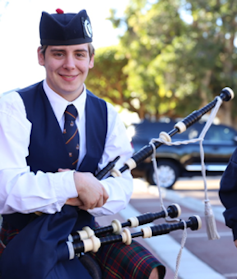


With guidance from renowned occupational therapist Leah M Kuypers who devised a 'Zones of Regulation' curriculum, we have introduced the concept of four coloured zones that represent common emotions. When in the Blue Zone, our body is running slow and rest is needed because we may be feeling tired, sick, sad, hurt, bored or shy. The Green Zone, like a green traffic light, signals that we are good to go because we are feeling happy, calm, proud, focused, relaxed or content. Sometimes, our emotions escalate a little and we enter the Yellow Zone. This is a zone where we must proceed with caution and slow down because we may start to lose control if feeling frustrated, overwhelmed, excited, worried, anxious, silly, scared, jealous, embarrassed, confused, nervous or annoyed. Finally, the Red Zone is reserved for those extreme emotions such as terror, uncontrolled anger, aggression and elation. When in the Red Zone, we must recognise that we are out of control and will have trouble making good decisions and need to stop.

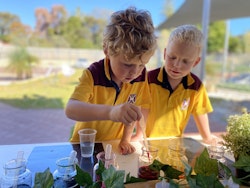
Through these four zones, we have continued to develop the children's inquiring dispositions by introducing a digital gallery of wondrous artwork from many famous artists around the globe. Each carefully selected piece of art invites an emotional response and gently prompt the children to thoughtfully question themselves, question others and consider how the art was made, whilst discovering the stories and emotions that are hidden within. The children are given time to stop, stare, ponder and wonder. They are incredibly quick to recognise which Zone of Regulation is being expressed through each piece and articulate calming strategies that can be implemented to get back into that optimal Green Zone. These art provocations have also inspired the children to express their emotions through their own process-based art. We look forward to showcasing our Kindergarten Art Gallery with our families at the conclusion of this inquiry.

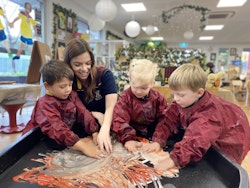


Mrs Olivia Harnwell
Kindergarten Teacher
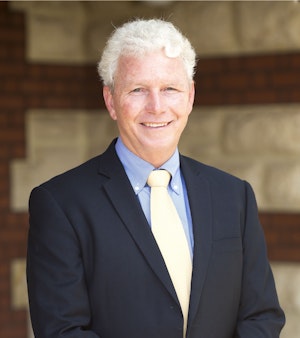
Mr Richard Ledger
Head of Middle School
The last vestiges of the COVID-19 closure from an absentee perspective came to an end on the weekend with the return of our Year 7 & 8 boarding students. Hooray! There were quite a few faces we had not seen for a while. We know that teaching adolescent boys has some challenges and even more so when they are removed from the social setting of a classroom or school. Without the intrinsic motivation of being with their friends, the challenge to keep a boy focused and on task is amplified. To our rural and remote parents, thank you for adding the additional role of teacher to your existing job description and for many of you at the busiest time of the year during seeding. This was an extra challenge and your support was most appreciated. Starting this week, we will have an intensive five weeks of learning before we head to the mid-year break. Hopefully we are not that far away from events such as assemblies and Chapel.
Last week we ran one of our two annual Wellbeing surveys with our students. It is a survey that offers each student an opportunity, in a confidential manner, to indicate aspects of school life that work well for him and aspects that cause anxiety and worry. This data provides aspects for us to address and monitor or take direct action on. One of the critical aspects for us is the relationships students have with each other. In Middle School some boys have had five or six years together. Understanding how their behaviours and personalities contribute to the wellbeing of others is crucial as boys thrive when they have confidence in those around them. In the next edition of The Thistle we will summarise some of this data for you.
This was a topic of discussion with teachers at a recent professional development session that drew attention to the fact that vocabulary (the knowledge of word meanings) and the development of an extended vocabulary remains a fundamental building block in our ability to comprehend and deliver information. Illustrating this, these six words came up in conversation in Year 7 & 8 subject conversations: orthographic, mendacious, vascular, igneous, isthmus, baptism. Encouraging boys to explore challenging words, their meaning, and how complex words are put together, can happen anytime, inside and outside of school. If research by O’Conner (2014) is an indicator, depth of vocabulary is the best single indicator of academic and future occupation success. I ask you to please check which your son tonight to see how he went on the above six words.
Last year saw the partial introduction of the iPad as an art-making tool in Visual Art for Year 6. In Summer Term this year I decided to use it as the sole art-making device for the existing 'Crazy Creatures' project. I let the boys loose with the technology to fully explore the potential of the platform both technically and creatively. Students used a range of apps such as Adobe Draw, Adobe Sketch, Adobe Fresco and Sketches, and were allowed to pick what best suited their work flow.

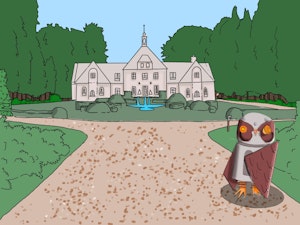
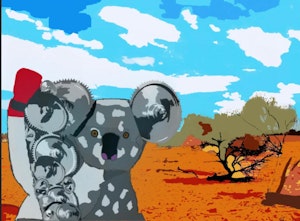
| Guillaume Daoud 6.4 | William Macknay 6.4 | Charlie Robinson 6.4 |
The results were impressive to say the least. Unquestionably, the general standard of work across the two classes was higher than in previous years. Whilst there are some obvious technical differences in comparison to traditional painting and drawing mediums, the sheer range of possibility and flexibility of the technology in the hands of nimble and intuitive users meant that students were focused, engaged and noticeably successful in their production of artwork.

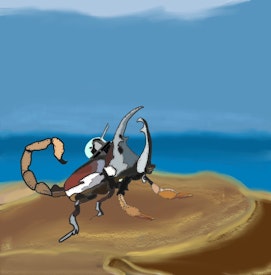
| Luke Schaufler 6.4 | Thomas Lovegrove 6.1 |
I am ever mindful of the Visual Arts staying relevant and engaging to the boys. Whilst these are far from traditional mediums, I am mindful of the world these young men will emerge into as young adults and the skills and competencies that may serve them well, or even be essential, once they get there. As a result, I am now going to adjust the Year 7 and 8 programmess to more directly incorporate digital technology to harness the momentum we have established this year.
Mr Scott Bycroft
Middle School Visual Art Teacher
For details of upcoming events, please refer to the online calendar through www.home.scotch.wa.edu.au.
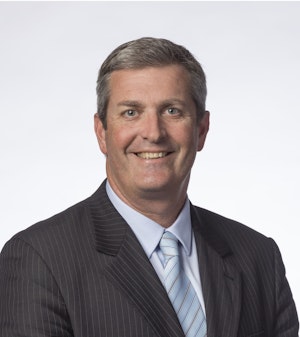
Mr Peter Burt
Head of Senior School
There has been significant discussion and planning amongst staff and students about the operation of our service programmes during the current COVID-19 situation . There are clearly limitations to what we can do and when we can restart the Year 10 programme and, unfortunately, we will be unable to visit many of the organisations and facilities with whom we have forged long-term relationships. However, with change comes opportunity.
In the short-term, we are likely to be offering more campus-based experiences in the Year 10 programme, while our Senior Leaders are investigating how we can support another important cause. More information about that will follow in the near future .
In another context, Mr Michael Scaife recently shared some initiatives the College is looking to implement, following the India tour last December. While some are still very much in the formative stages, the opportunity for our students to further develop our relationship with the Mukti Mission is exciting.
While in India, the boys spent a week living at one of the schools, where they interacted with the students and taught classes in Physics, Mathematics, Chemistry and English. This was an incredible privilege for our students, which they approached with enthusiasm and responsibility. While teaching others, they also learnt a great deal about themselves and about how others learn. The boys took the time to reflect on their own lives and on how they could help other less fortunate students with the conditions and some of the circumstances in which they live.
The students experienced both challenges and rewards as they utilised their IT knowledge while working with Dr Nick Spadaccini to establish computer labs that had sat idle because the staff at the school had been unable to set them up.
In reflecting on the conversation with Mr Scaife, it is clear that two of our core values were central to the tour and the manner in which our students approached it:
Service: acts of helpful activity; assistance and support; to do someone service.
Stewardship: using talents, abilities and resources in a responsible and honourable manner.
These values are embodied in many of our day-to-day actions and it is incumbent on all of us to reflect on them and how they guide us as we go about our lives.
While the next service tour to India is not scheduled until late 2021, and may still be impacted upon by COVID-19, the College is investigating other ways to help the students and staff at the Mukti schools. Our recent online experiences have highlighted new prospects, in terms of our ability to interact with each other, and the work undertaken on the tour in setting up the IT labs has laid the foundation for us to reconnect and provide further learning opportunities for our own students and those in India.
Part of being community-minded and service-oriented is doing what is required of us in order to limit the spread of the COVID-19 virus and to keep the vulnerable in our midst safe. Even though active outreach is still on hold, everyone has contributed to the greater good by isolating, maintaining physical distancing and attempting to encourage and support each other.
Our open Scotch tennis courts and fields have been a great service to the local community. They have allowed so many people to enjoy getting out with their pets and to engage with others in safe and responsible ways.
On Anzac Day, a number of our trumpeters and pipers paid tribute to past and currently serving members of our armed forces by playing in their driveways at allocated times during the day. I accompanied Pipe Major David Stulpner and a team of pipers as they played outside three aged care homes near the school. It was very moving to see how much this meant to the residents and even to people in neighbouring apartments and homes.
Sadly, this year it was impractical to hold the World's Greatest Shave (a joint venture with PLC in support of The Leukaemia Foundation) on our school grounds. Despite this, more than a hundred Year 12 students shaved their heads, continuing to support the amazing cause. Below are some before and after pics. Students still managed to raise a staggering $33,753 for The Leukaemia Foundation.
Thank you to staff who have continued to cook meals, providing the Salvos with around 100 meals each week. Organisations like the Salvos are struggling to support the increasing number of people who find themselves in very precarious positions, so our meals are greatly appreciated. If anyone would like to be part of this service outreach, please contact Rev Gary for more information.
Besides the economic devastation that COVID-19 has brought, many predict that a surge in mental health struggles will soon follow. Looking out for others, supporting each other, being a friend, are forms of service we can all engage in.
With our Year 12s returning to school this week, we look forward to working with service captains to find creative ways of continuing service activities until we can cautiously restart some of the service programmes.
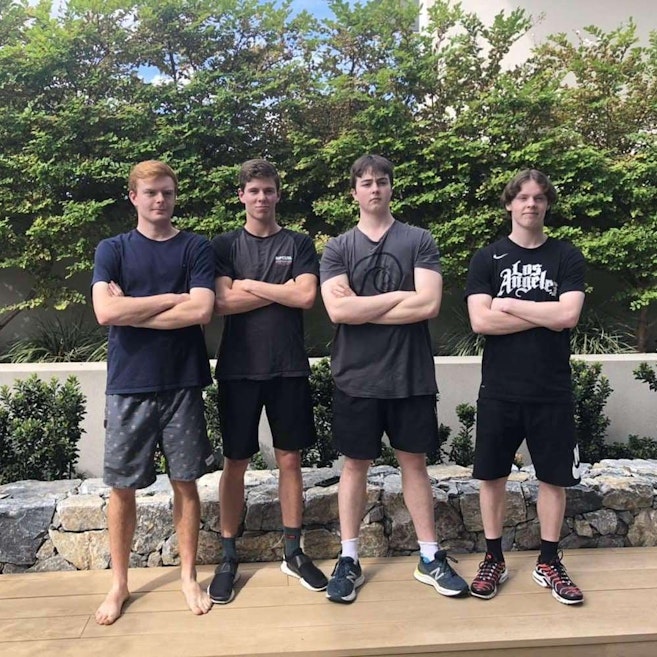
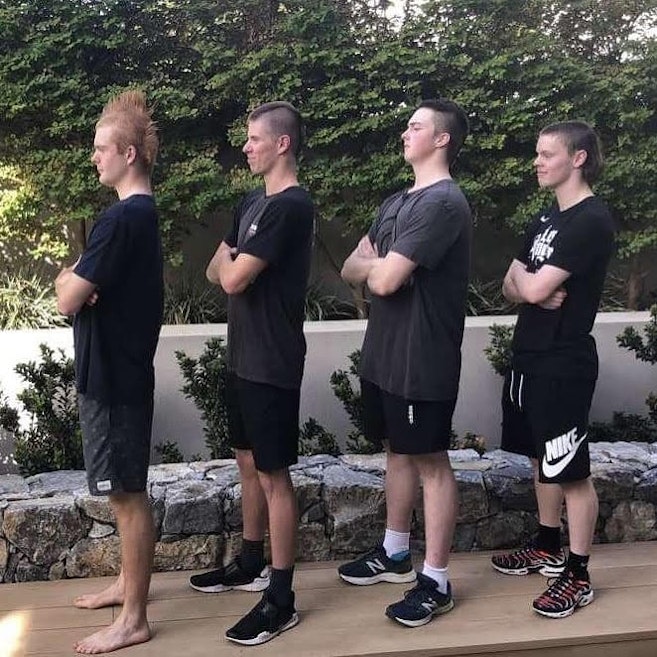
Rev
Gary van Heerden
Chaplain
A comprehensive summary of university applications has been emailed to all Year 12 students and their parents. This information changes frequently and as such students and parents are advised to access the websites of each university or organisation to keep abreast of any changes. Parents and students can also contact Mr Frusher, Careers Advisor, to seek further advice and clarification.
Year 12 students who are considering university entry in 2021 should now be starting to research universities and courses. Learn more about all universities and courses in Australia.
The Year 10 Information Handbook 2020 and Year 12 in 2022: Information for Year 10 Students and their Parents, and WACE requirements are now available online.
Information for parents is highly sought after when it comes to helping their children with their career choices. For that reason, myfuture has developed an Assist your child feature page containing links to tips and advice for parents and carers to assist their child with their career development.
Mr Peter Frusher
Careers Advisor
For all upcoming events, visit our online calendar at www.home.scotch.wa.edu.au.
We’re celebrating Vicki Weston’s recent donation of photographs and memorabilia belonging to her father Raymond Hepworth (OSC 1944).
The donation includes photographs of Raymond and his older brother Walter, who attended Scotch College in the 1930s. Their father worked for the Department of Mines in the Goldfields, and both brothers boarded as a result. The brothers can be seen in their school uniform outside their various homes in towns such as Ora Banda, Coolgardie, Meekatharra.
Amongst the memorabilia are prize books won for General Proficiency and signed by Headmaster P. C. Anderson, testimonial letters, report cards, class photographs of the Cadet Core, Football team and Athletic team, a 1930s wooden tennis racquet, and an intricate silver trophy for winning the Scotch College ‘Doubles’ Tennis Competition. Walter Hepworth was also awarded the positions of Prefect, Captain of Cricket and Vice-Captain of Football during his time at Scotch.
![The Hepworth brothers at their family home in the Goldfields. [From left to right]: Unknown man in Australian RAAF uniform (left), Raymond Eric Hepworth (OSC 1944) in Scotch College school uniform (centre) and Walter Allan Hepworth OSC1935 in suit (right).](http://millstreamcms-01.imgix.net/thistle2019.scotch.wa.edu.au/upload/pages/20200602125800/1.-1941-raymond-eric-hepworth-osc1944-and-walter-allan-hepworth-osc1935_1954.jpg?version=1&w=274&h=450&blend=00000000)


The Hepworth brothers at their family home in the Goldfields. [From left to right]: Unknown man in Australian RAAF uniform (left), Raymond Eric Hepworth (OSC 1944) in Scotch College school uniform (centre) and Walter Allan Hepworth OSC1935 in suit (right); Family portrait of Walter Allan Hepworth (OSC 1935) and Raymond Eric Hepworth (OSC 1944) as children, 1930; Raymond Eric Hepworth (OSC 1944) pictured with Scotch College school friend out the front of the M-Block building, 1940
In this poignant photograph, taken on Easter Sunday (13 April 1941), the brothers are pictured out the front of their family home, possibly in Meekathara or Coolgardie. Fourteen-year-old Raymond wears his winter uniform alongside his brother Walter, who was twenty-two years at the time – the brothers smile as they look directly at the camera. A family friend of the Hepworth’s is also featured, wearing a tailored RAAF uniform. This photograph marks one of the last images of the brothers together and was taken shortly before Walter enlisted in the RAAF in April of that year. Tragically, he never returned home and lost his life while in action in Timor on 9 July 1943; serving the No. 2 Flying Squadron as Officer 406851.
Raymond served in the Army Reserves and kept his brother’s memory alive by volunteering for the RSL Honour Avenue Committee, which preserves memorial plaques in Kings Park. Raymond became Committee Chairman in the 1980s and oversaw the creation of a commemorative plaque for Walter, located at Marri Walk. The archival donation features a photograph of the plaque stating: “In Honour of F/O [Flying Officer] W.A. Hepworth RAAF Killed in Action Timor 9 Jul 1943 Aged 25 Dedicated by His Family”.
The Weston-Hepworth family’s donation offers a fascinating insight into the lives of the Hepworth brothers. Walter’s sacrifice in serving our country in World War II resonates deeply at Scotch College, and reminds us of the many Masters and Old Scotch Collegians who never made it home.
Ms Yasmin McDonald
Archivist

Scotch College Football XVIII team, 1934